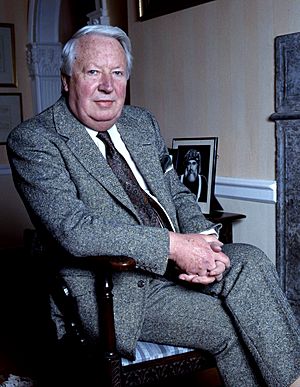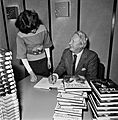Edward Heath facts for kids
Quick facts for kids
Sir Edward Heath
|
|
|---|---|

Heath in 1987 by Allan Warren
|
|
| Prime Minister of the United Kingdom | |
| In office 19 June 1970 – 4 March 1974 |
|
| Monarch | Elizabeth II |
| Preceded by | Harold Wilson |
| Succeeded by | Harold Wilson |
| Leader of the Opposition | |
| In office 4 March 1974 – 11 February 1975 |
|
| Monarch | Elizabeth II |
| Prime Minister | Harold Wilson |
| Preceded by | Harold Wilson |
| Succeeded by | Margaret Thatcher |
| In office 28 July 1965 – 19 June 1970 |
|
| Monarch | Elizabeth II |
| Prime Minister | Harold Wilson |
| Preceded by | Sir Alec Douglas-Home |
| Succeeded by | Harold Wilson |
| Leader of the Conservative Party | |
| In office 28 July 1965 – 11 February 1975 |
|
| Preceded by | Sir Alec Douglas-Home |
| Succeeded by | Margaret Thatcher |
| Member of Parliament for Old Bexley and Sidcup (n.b.) |
|
| In office 23 February 1950 – 14 May 2001 |
|
| Personal details | |
| Born |
Edward Richard George Heath
9 July 1916 Broadstairs, Kent, England |
| Died | 17 July 2005 (aged 89) Salisbury, Wiltshire, England |
| Resting place | Salisbury Cathedral |
| Political party | Conservative |
| Alma mater | Balliol College, Oxford |
| Occupation |
|
| Military career | |
| Service/ |
|
| Rank | Lieutenant colonel |
| Service number | 179215 |
| Battles/wars | World War II |
| n.b. | |
Sir Edward Richard George Heath KG MBE (9 July 1916 – 17 July 2005), often known as Ted Heath, was a British Conservative politician. He was Prime Minister of the United Kingdom from 1970 until 1974. Heath was also the leader of the Conservative Party from 1965 until 1975.
Heath was educated at Balliol College, Oxford.
In 1937, as a student when he was travelling in Nuremberg, Heath met three of Adolf Hitler's top Nazi leaders Hermann Goering, Joseph Goebbels and Heinrich Himmler. He described Himmler as the most evil man he had ever met. Heath also travelled to Barcelona in Spain in 1938 at the time of the Spanish Civil War. In 1939, Heath went again to Germany, and returned to Britain before the outbreak of World War II.
Heath was a lifelong bachelor. He never married.
He was also a classical organist and conductor and a sailor.
Contents
Early life
Edward Heath was from a working class family, the son of a carpenter and a maid. He was the first of two important post-World War II prime ministers to come from the lower ranks of society (the other being Margaret Thatcher). Heath went to a grammar school in Ramsgate, and won a scholarship to Balliol College, Oxford. Heath was a talented musician, and won the college's organ scholarship in his first term. This enabled him to stay at the university for a fourth year. He eventually graduated with in philosophy, politics and economics (PPE) in 1939.
Heath served in the army in WWII, starting as a second lieutenant in the Royal Artillery. In 1944 he took part in the Normandy Landings. Heath was eventually demobilised (left the army) as a lieutenant-colonel in 1947.
After a spell in the Civil Service, Heath won a seat as Member of Parliament (MP) for Bexley in the February 1950 general election.
Political career
Heath's early appointments were as a whip in the Conservative Party in the House of Commons. He rose to be Chief Whip and Parliamentary Secretary to the Treasury from 1955 to 1959. Harold Macmillan appointed him Minister of Labour, a Cabinet post, in 1959.
In 1960 Macmillan gave Heath responsibility for negotiating the UK's first attempt to join the European Economic Community (as the European Union was then called). After extensive negotiations, the British entry was vetoed by the French President, Charles de Gaulle.
From 1965 to 1970 Heath was Leader of the Opposition when the Labour Party were in power. Then he was elected Prime Minister in the General Election of 1970.
During his premiership the UK government passed through parliament some quite radical changes.
Currency and metrication
Since Anglo-Saxon times, the currency of England (and so later the UK) was based on the pound sterling, at a rate of 240 pence to £1. On 15 February 1971, known as Decimal Day, the United Kingdom and Ireland decimalised their currencies.
This change had many consequences, but it was eventually accepted by most people. It was an expensive change. Not only was the whole of the currency in circulation changed, but many mechanical gadgets also had to be changed. Every cash register in the country, every commercial machine which took coins, every public notices of monetary charges, and so on.
The other change, which happened at roughly the same time, was metrication of the old imperial system of weights and measures. This idea dated to before Heath, and was continued after him by the next Labour government. It was never fully completed. Speed limits are still in miles per hour, and measurements of length are still in traditional yards, feet and inches, with metric as an alternative. Once again, the changes were hugely expensive. It meant an almost complete retooling in the machine tool industry.
It was mainly done because joining the European Economic Community (EEC) in 1973 obliged the United Kingdom to take into its law all EEC directives. These included the use of a prescribed SI-based set of units for many purposes within five years. However, metric measures are not much used in everyday life in the UK.
Joining Europe
Heath took the United Kingdom into Europe with the European Communities Act 1972 in October.
Once de Gaulle had left office, Heath was determined to get the UK into the (then) European Economic Community. The EEC economy had also slowed down and British membership was seen as a way to revitalise it. After a 12-hour talk between Heath and French President Georges Pompidou Britain's third application succeeded.
End of his premiership
Heath failed to control the power of the unions. Two miners' strikes damaged the economy. The 1974 strike caused much of the country's industry to work a three-day week to conserve energy. That was enough for the electorate to put the government out of office. The loss of the 1974 general election ended Heath's career at the top. The Conservative Party replaced him with Margaret Thatcher.
Images for kids
-
Heath with US president Richard Nixon at the White House in 1973
-
Heath greeting US president Gerald Ford in September 1974
-
Heath's monument in Salisbury Cathedral
See also
 In Spanish: Edward Heath para niños
In Spanish: Edward Heath para niños










